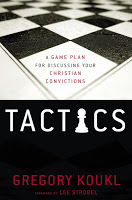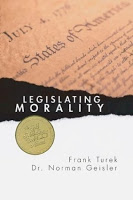by Natasha Crain
Over the last few months since Talking with Your Kids about God came out, I’ve heard from a lot of parents who especially love the conversation guides provided in the book. Every chapter has one of these guides to help parents have a conversation with their kids about that chapter’s content. There’s an easy conversation starter to get kids thinking (“Open the Conversation”) and several questions to help you dig in deeper (“Advance the Conversation”). For parents with younger kids, it can be enough to just use the question from “Open the Conversation” to hit a couple of key points from the chapter on the way to school in the morning!
One of the most valuable parts of each chapter’s conversation guide is in the section, “Apply the Conversation.” This section features a quote from a skeptic that pertains to the chapter’s subject. This gives you and your kids the opportunity to practice applying what you just learned by developing a response. I didn’t provide sample answers to these in the book, as they’re intended to get you thinking on your own! However, I’ve received so many requests for sample responses that I’ve started to write them, and I’ll be sharing them here on the blog in five separate posts over time (one post for each of the five book sections).
Today I’m sharing sample responses for Part 1: The Existence of God (6 chapters). I want to emphasize three things before you read these.
First, there are a lot of possible ways to effectively respond to any of these skeptics’ quotes! Don’t consider these answers to be the “right” answers.
Second, all of these responses are based on the chapter content itself. There’s much more that could be said, but I’m only including concepts based on what your kids would learn from reading the chapters.
Third, encourage your kids (if old enough) to try writing their own response after you talk about the chapter’s content. Writing responses really helps kids to flush out their thoughts and process the material. With my daughter’s permission, I’m sharing her response to the chapter 2 skeptic in that section below as an example.
Chapter 1: What Can We Learn about God from Nature?
Skeptic’s Quote
Atheist author Dan Barker says, “I am an atheist because there is no evidence for the existence of God. That should be all that needs to be said about it: no evidence, no belief.” Based on what you learned in this chapter when someone says there’s “no evidence” for God, what questions could you ask to clarify what that person means?
Sample Response
Evidence is a body of facts that require human interpretation. In other words, evidence itself doesn’t say anything. Humans can all look at the same evidence and come to different conclusions due to factors like our varied assumptions, available information, and motivations. As such, there will always be multiple possible explanations for the evidence we see in the world around us. With that as context, I’d like to ask a few questions about what you mean when you say there’s “no evidence” for God.
First, when you say God, are you generally referring to the existence of any supernatural being, or are you referring specifically to the God of the Bible? Second, when you say there’s no evidence for God’s existence, are you saying that there’s no evidence that could possibly be relevant to the question of God’s existence, or that there’s no evidence which you believe is best explained by the existence of God? Finally, what kind of evidence would you expect there to be if a supernatural being existed?
Chapter 2: Where Did the Universe Come From?
Skeptic’s Quote
In an online forum, a person asked how atheists can argue that the universe came from nothing. An atheist replied, “Personally I do not claim that the universe ‘came from’ anything at all and it did not ‘appear.’ The universe just is… it needs no creation story.” Based on what you learned from this chapter, how would you respond to this person?
Sample Response
I’d like to understand better what you mean when you say the universe “just is” and that it didn’t come from “anything at all.” Do you mean that you believe the universe is eternal, or that it had a beginning but its beginning doesn’t require an explanation?
[If the response is that the universe is eternal…]
While many people before the 20th century agreed that the universe is eternal, scientific evidence mounted in the 1900s that the universe actually had a beginning. For example, in the 1920s, astronomer Edwin Hubble discovered through the world’s largest telescope at the time that galaxies are moving away from us, like spots on an inflating balloon. He and other scientists realized that this expansion implied there was a beginning to the universe (if you rewind the process of something expanding, you logically arrive at a beginning point). Through this and many other discoveries in the 1900s, scientists came to the consensus that the universe began to exist and is not eternal.
The reason that this is a significant point to consider is that an eternal universe, as you say, wouldn’t have “come from” anything at all—it wouldn’t have had a beginning. But if the universe did have a beginning, as the scientific evidence overwhelmingly shows, we have to ask what caused it to exist. We know that nothing in the universe pops into existence without a cause, so it defies our experience to suppose that the universe itself did. Something or someone supernatural—beyond nature—must have caused it to exist. In order to create space, time, and matter, the cause would have to be spaceless, timeless, immaterial, and uncaused itself. This doesn’t tell us the cause is synonymous with the God of the Bible, but it’s consistent with Him.
[If the response is that the universe began to exist but doesn’t require an explanation…]
We know that nothing in the universe pops into existence without a cause, so it defies our experience to suppose that the universe itself did. If you are claiming that the universe indeed popped into existence from nothing despite this knowledge, why have you concluded that’s the best explanation for it? To simply assert that something doesn’t “need a creation story” is not a replacement for looking at this evidence and determining the best explanation. I could similarly claim that my computer monitor doesn’t need a creation story, but that doesn’t negate the fact that it does indeed have one. Given what we know, the best explanation for the beginning of the universe is that there was something or someone supernatural—beyond nature—that must have caused it to exist. In order to create space, time, and matter, the cause would have to be spaceless, timeless, immaterial, and uncaused itself. This doesn’t tell us the cause is synonymous with the God of the Bible, but it’s consistent with Him.
[As an aside, here is my 9-year-old daughter’s response after we studied the chapter the first time. While she doesn’t get every detail exactly right, it’s a great start! I love her first line, as that’s the crux of the issue.]

Chapter 3: Where Did Life Come From?
Skeptic’s Quote
A person commenting on an online article said, “Had [fine-tuning] not occurred…life here would either not exist, or it would be different. That doesn’t mean there’s some big fairy who made it happen. Just because we survived on this planet does not mean a god made the planet for us.”
Sample Response
You are correct that “just because” we are on this planet, we shouldn’t necessarily believe that a god (the biblical God or any other supernatural being) put us here. I’m not assuming that’s the case, just as you shouldn’t assume it’s the case that a supernatural being did not put us here. We both should look at the available evidence and consider the best explanation for what we see.
The fine-tuning that we’re talking about is extensive in scope–over 150 parameters of a planet, its planetary companions, its moon, its star, and its galaxy have been identified that must have values falling within narrowly defined ranges for physical life of any kind to exist. The probability of those factors individually taking a precise value and simultaneously taking those values is astronomically low (by some estimates, the probability that even one life-supporting body would occur anywhere in the universe is less than 1 chance in 10 to the 282nd power). Even most atheist scientists acknowledge that the universe at least appears to be finely tuned. The question, then, is: What is the best explanation for this remarkable finding? No one is suggesting a “fairy” made it happen, so let’s set aside facetious explanations and have a serious discussion. The real conversation is whether this fine-tuning is a product of chance or intelligence. To be clear, no one is claiming that the intelligence is necessarily the God of the Bible, so we can also set aside any preconceived notions about who He is. We are only considering whether what we see is more consistent with a series of chance events or with the product of intelligence. Given the delicate fine-tuning that has been identified, I think it’s far more reasonable to believe that it’s the result of a purposeful intelligence beyond nature. Why do you believe a better explanation is chance?
Finally, suggesting that life just wouldn’t exist to witness fine-tuning had it not happened is not an explanation—it’s just a fact. It doesn’t address whether chance or intelligence is the best explanation for the occurrence. And speculating that other kinds of life (non-carbon-based) may have existed instead if the universe was structured differently doesn’t address the fact that much of the fine-tuning we see is necessary for the universe to even exist in the first place. This has nothing to do with the specific kinds of life that may or may not develop.
Chapter 4: Where Did Our Moral Understanding Come From?
Skeptic’s Quote
“Do we really need religion in this day and age? If you know the difference between right and wrong, why do you need religion? If you can show respect, why do you need religion? If you can make a positive difference in someone’s life, why do you need religion? What matters is how you treat someone. Put a smile on their faces. It’s that easy.”
Sample Response
Your questions all assume that religions only exist to provide moral rules for living. To be sure, almost every religion includes moral directives. However, religions also make many other truth claims about things such as where we came from, why we’re here, who we are, and where we’re going. Additionally, religions make logically contradictory claims, so they can’t all be true at the same time (for example, in Christianity, Jesus is the exclusive path to God, and in Islam, he is not).
That leaves us with two possibilities: 1) no religion is true (they are all manmade ideas) or 2) one religion is true. Reading between the lines, you seem to believe the first possibility since you associate religion with a past “day and age” (in other words, you’re assuming religious beliefs are something cultures outgrow as they become more sophisticated). At the same time, you seem to assume that right and wrong in fact exist. If you do believe that there are things that are right or wrong for all people, and not just a matter of personal opinion, then you are acknowledging the existence of what would be called objective moral values. On that, I completely agree with you. I think it’s our deepest human intuition that things like child kidnapping, rape, and torturing someone for fun are wrong, regardless of anyone’s opinion to the contrary. Where we differ is on the implications of that fact. I do not believe that there can be objective moral values if God doesn’t exist. Let me explain.
If objective moral values exist, we have to ask where those values would come from. In a world that is made of nothing more than matter (physical “stuff”), there can be no right or wrong for all people because there is no moral authority. No one could say what anyone should or shouldn’t do because everything would be a matter of opinion. For example, in such a world, you couldn’t say that “what matters is how you treat someone” (unless you are only stating that as your own opinion and aren’t suggesting that’s an obligation for all people). But if objective moral values and duties do exist, that points to a higher-than-human moral authority; moral laws require a moral lawgiver.
Does that mean the moral authority is the God of the Bible specifically? Not necessarily. Knowing that requires a consideration of the evidence for the truth of the Bible. But if that evidence leads us to conclude that the Bible, and therefore Christianity, is true (possibility 2 above), then there’s much more than moral directives at stake: Jesus is the exclusive savior of the world and only by trusting in him will we have eternal life.
Chapter 5: What is the Difference Between God and a Flying Spaghetti Monster?
Skeptic’s Quote
Atheist and bestselling author Richard Dawkins says, “I have found it an amusing strategy, when asked whether I am an atheist, to point out that the questioner is also an atheist when considering Zeus, Apollo, Amon Ra, Mithras, Baal, Thor, Wotan, the Golden Calf and the Flying Spaghetti Monster. I just go one god further.”
Sample Response
By grouping the biblical God with all of these fictional beings, I understand you’re suggesting that there’s no difference between them—those “gods” don’t exist, just as the biblical God doesn’t exist. But simply claiming that the biblical God belongs on a list with fictional beings isn’t a “strategy” for demonstrating He’s fictional as well. It’s simply an assertion based on the assumption that there’s no evidence that any of these beings—including the biblical God—exist. It’s important to acknowledge, however, that theists do believe there is evidence for God’s existence and are not blindly guessing that He exists; it’s not a foregone conclusion that there’s no evidence for God and theists are happy to believe anyway. Rather, theists are looking at a set of facts about the universe and are asserting that the best explanation for those facts is the existence of God. Atheists are looking at the same set of facts and are asserting that there are better natural explanations for those facts. We can legitimately disagree over the interpretation of the evidence, but it’s disingenuous to imply or explicitly claim that theists aren’t basing their beliefs on any evidence at all.
Chapter 6: How Much Evidence Do We Need to Be Confident God Exists?
Skeptic’s Quote
When an agnostic college student was asked what would be compelling reasons for him to believe that the God of the Bible exists, he said, “I would have to say unambiguous, direct evidence…Some people will use their explanation for God existing as things we don’t know… [like] the arguments [that] everything is so fine-tuned, but that doesn’t do much for me. I would very much prefer to have actual, direct evidence of somebody saying, ‘This directly points to God Himself coming down and speaking.’ And at that point, I’d have to verify with someone that I’m not hallucinating…It has to be some direct evidence of God, not an extrapolation of evidence from something else.”
Sample Response
I understand your desire to have God reveal Himself in a very personal, direct way to every individual. I would love that too! However, we should acknowledge that whether or not God chooses to reveal Himself according to our personal preferences has no bearing on whether or not He actually exists. Just as a detective doesn’t get to choose what kind of evidence he has to work with, we don’t get to choose how an all-knowing, all-powerful God would reveal Himself if He exists. Rather, we have to consider the evidence in the world around us and determine what the best explanation is for that evidence.
I know you said you would “prefer” other kinds of evidence than the fine-tuning of the universe, but the fact remains that our universe and planet are precisely structured to support life. We can’t shrug our shoulders at that just because we want other evidence; we have to ask ourselves what we can best infer from that reality. We also have other pieces of evidence to consider—such as the universe having a beginning (which requires a cause from outside of nature), the origin and complexity of life, and the innate moral understanding humans seem to have. In each of these cases (which we could discuss further), the best explanation given what we know from the evidence is the existence of a universe-creating, life-designing, moral law-giving being outside of nature.
Does that leave us with absolute certainty about His existence? No…but we don’t look for that level of certainty with anything in life. We trust based on what we have good reason to believe is true.
And does that tell us this being is the God of the Bible? Not necessarily. It’s certainly consistent with Him, but we would need to look at the evidence for the truth of the Bible to connect them. This, of course, is important to consider—especially since you said you’d like evidence that “directly points to God Himself coming down and speaking.” Christians believe God did exactly that in the person of Jesus Christ. We have compelling evidence that the Gospels of the New Testament were written by or based on eyewitness testimony of those who knew Jesus personally. If we can determine that these witnesses are reliable, then we have good reason to trust their testimony that the kind of evidence you happen to want is exactly what God has given us (albeit 2,000 years ago). Would you like to talk more about the reliability of the Gospels?
If you enjoyed reading these responses, please share this post!
Click here to get your own copy of Talking with Your Kids about God, or find it at your local bookstore.
Original Blog Source: http://bit.ly/2Hqw4fd

















